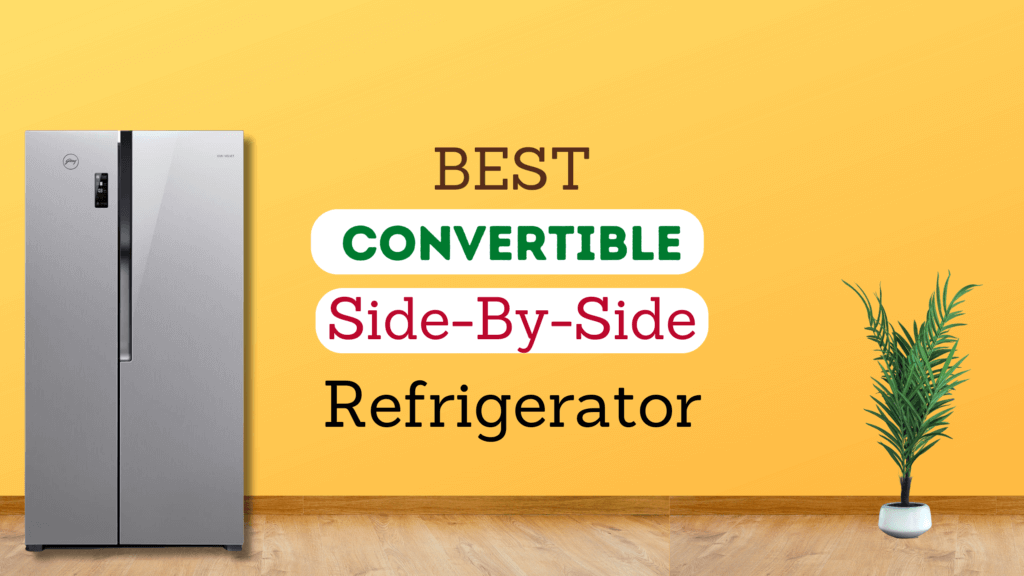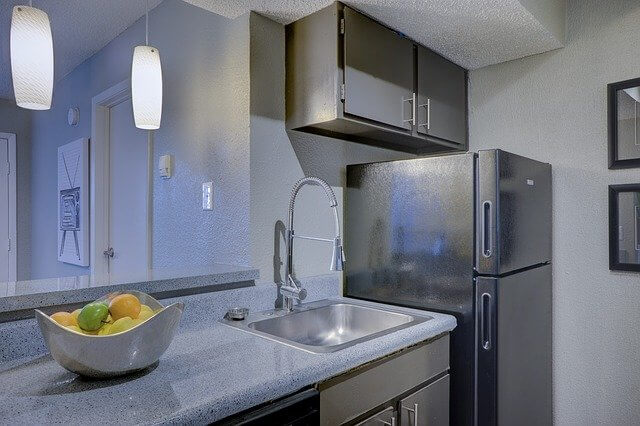Are you planning to buy a new refrigerator? Want to understand the difference between inverter compressor and normal compressor in the refrigerator?
Selecting the best refrigerator for your dream home can be a challenging task. There are a lot many brands available in the market. And each brand offers numerous models.
Moreover, the types of refrigerators, their sizes and their technology also vary. As such, each of these factors makes the selection process even more difficult.
A lot of research goes into the process of shortlisting the best refrigerator. And a common question that you’re most likely to come across is ‘What is Inverter Fridge?’
Simply put, an Inverter Fridge is one whose Compressor is powered by Inverter Technology.
Read on to understand this in greater detail.
- What is Compressor in Refrigerator?
- What is Inverter Technology in Refrigerator?
- What is Inverter Compressor in Refrigerator?
- Difference between Inverter Compressor and Normal Compressor in Refrigerator
- Inverter Compressor Refrigerator Price
- Best Inverter Refrigerator
- Inverter Refrigerator Wattage
- Advantages and Disadvantages of Inverter Refrigerator
- Which Compressor is Best for Refrigerator?
- Inverter vs Non Inverter Refrigerator Power Consumption
- Difference between normal compressor and digital inverter compressor in refrigerator
- At a Glance – Difference between normal compressor and digital inverter compressor in refrigerator
- Inverter compressor vs reciprocatory compressor
- At a Glance – Inverter compressor vs reciprocatory compressor
What is Compressor in Refrigerator?
The part of the refrigerator that turns the refrigerant from gas to liquid is called a compressor.
In other words, your refrigerator cools when the refrigerant gets converted from gas to liquid. This job is done by the compressor of the refrigerator.
And the compressor keeps doing this work continuously to maintain your refrigerator’s temperature.
What is Inverter Technology in Refrigerator?
Inverter technology in refrigerators uses a variable-speed compressor that adjusts its power to precisely match cooling needs, leading to quieter operation, more consistent temperatures, and significant energy savings.
Inverter Technology in Refrigerator is a superior technology of the compressor.
This is a relatively new concept that makes the inverter fridges stand apart from the traditional ones.
Read on for more details!
What is Inverter Compressor in Refrigerator?
A normal compressor maintains the required temperature of the refrigerator by way of a ‘start and stop’ process.
It starts and runs at full speed when it needs to cool down your fridge and stops when the required temperature is reached.
On the other hand, the inverter compressor doesn’t stop at all.
The inverter compressor starts slowly and then works at an increased speed till the required temperature is reached. It then slows down and keeps maintaining the temperature – without stopping.
Once the temperature rises, it again runs at an increased speed and then slows down on reaching the desired temperature.
So, it keeps running at variable speeds to maintain the pre-set temperature of the refrigerator.
Difference between Inverter Compressor and Normal Compressor in Refrigerator
For a better understanding of inverter vs non inverter fridge, you may like to know the difference between inverter and non inverter refrigerator.
| Inverter Compressor vs Normal Compressor | Inverter Compressor | Normal Compressor |
|---|---|---|
| Electricity consumption | Inverter Compressor uses less power as it runs steadily at managed speed | Each time the Normal Compressor starts, it uses more current. This increases the electricity consumption |
| Lifespan | Inverter Compressors are more durable as they start slowly | Normal Compressors comparatively have a lesser lifespan. They are more prone to damage while starting each time |
| Extra Fresh Food | As Inverter Compressor doesn’t stop altogether, a consistent temperature is maintained in the refrigerator. This helps retain the freshness of foodstuff | Stopping the Normal Compressor and starting again causes sudden and frequent fluctuation in the temperature. This leads to a loss of freshness |
| Soundless operation | Inverter Compressors function silently | Some sound is noticed in the Normal Compressors each time they start and stop |
Inverter Compressor Refrigerator Price
Inverter Compressor Refrigerators are available in different sizes. They are also available in different types like single door refrigerators or double door refrigerators. So the price varies as per the specifications and model.
But you’ll get a fair idea below.
The price of the single door 184 Litres Inverter Compressor Refrigerator is about Rupees 15,000/-.
An 189-liter Single Door Digital Inverter Refrigerator can cost you about Rupees 17,500/-.
Similarly, the price of the double door 240 Litres Inverter Compressor Refrigerator is about Rupees 26,000/-
It goes to about Rupees 37,000/- for a 343 Litres Refrigerator.
Best Inverter Refrigerator
✅ Don’t miss the Handpicked Inverter Double Door Refrigerators
| Best Convertible Refrigerator | Capacity (Litres) | Convertible Type | Compressor Type | Performance Score |
|---|---|---|---|---|
| Samsung | 322 | 5-in-1 convertible | Digital Inverter | 4.9/5 |
| Whirlpool | 259 | 10-in-1 convertible | IntelliSense Inverter | 4.9/5 |
| Samsung | 356 | 3-in-1 convertible | Digital Inverter | 4.9/5 |
| Haier | 278 | 5-in-1 convertible | Twin Inverter | 4.8/5 |
| LG | 335 | ConvertiblePLUS | Inverter Linear | 4.9/5 |
Inverter Refrigerator Wattage
The wattage of the Inverter Refrigerator varies as per the size, model and brand. So it can’t be generalized. But you’ll get a fair idea by knowing that the Whirlpool 265 L 3 Star Inverter Frost-Free Convertible Double Door Refrigerator has a wattage of 125 watts.
Read the detailed review of this amazing model here.
Advantages and Disadvantages of Inverter Refrigerator
While inverter refrigerators have several advantages – energy efficiency, quiet operation, and long life, the only disadvantage is that they come with a higher upfront cost.
Advantages of Inverter Refrigerators
- Energy Efficiency: They are significantly more energy-efficient than traditional refrigerators. This is because the inverter compressor can adjust its speed to maintain a constant temperature, rather than cycling on and off like a traditional compressor. This can save you money on your electricity bill and reduce your environmental impact.
- Quiet Operation: Inverter refrigerators are much quieter than traditional models. This is due to the smooth operation of the compressor at varying speeds, which eliminates the loud “kick-in” noise of traditional compressors.
- Longer Lifespan: The constant and smooth operation of the inverter compressor puts less stress on the motor, which can lead to a longer lifespan for the refrigerator. Some brands offer up to 10-year warranties on their inverter compressors.
- More Consistent Temperature: Inverter compressors can maintain a more consistent temperature inside the refrigerator, which can help keep your food fresher for longer.
- Advanced Features: Inverter refrigerators often come with additional features that traditional models don’t have, such as door-in-door compartments, ice makers with craft ice options, and smart home connectivity.
Disadvantages of Inverter Refrigerator
The only disadvantage of the Inverter Refrigerator is that it’s a little costlier than a refrigerator having a non-inverter compressor. 💲💲
But if the overall performance of the inverter compressor is considered along with its lifespan of more than 20 years, the difference in price is not much.
Moreover, the low electricity cost of an inverter refrigerator will make up for those few extra bucks that you’d spend while buying it. 👍
Which Compressor is Best for Refrigerator?
Wondering what is the best compressor for refrigerator?
The inverter compressor is the better choice for a refrigerator due to its energy efficiency, consistent cooling, and quieter operation. 🌟🌡️
It’s a smart investment for the long term.
If you can invest a little more, you must go for an inverter compressor refrigerator.
Inverter vs Non Inverter Refrigerator Power Consumption
The power consumption in an inverter refrigerator is less than that of a non-inverter refrigerator.
However, the power consumption depends on the brand, size and model of the refrigerator.
But you’ll get a fair idea on knowing that the Annual Energy Consumption of Whirlpool 265 L 2 Star Frost-Free (Non-Inverter) Double Door Refrigerator is 230 watts.
On the other hand, the Annual Energy Consumption of Whirlpool 259 L 2 Star Inverter Frost-Free Double Door Refrigerator is 269 kilowatt hours.
Read the detailed review of this amazing model here.
Non Inverter Refrigerator
Inverter Refrigerator
Difference between normal compressor and digital inverter compressor in refrigerator
The main difference between a normal compressor and a digital inverter compressor in a refrigerator lies in how they operate and their energy efficiency:
Operation
- Normal Compressor: A normal compressor in a refrigerator operates at a fixed speed, meaning it runs continuously at full power whenever it’s on. It starts and stops to maintain the desired temperature inside the fridge or freezer.
- Digital Inverter Compressor: A digital inverter compressor, on the other hand, operates at variable speeds. It can adjust its speed and power output based on the cooling demand. Instead of constantly turning on and off, it can run at lower speeds when cooling requirements are minimal and increase its speed when more cooling is needed. This results in a more precise and efficient cooling process.
Energy Efficiency
- Normal Compressor: Because a normal compressor operates at a fixed speed, it consumes a relatively consistent amount of energy. It is less energy-efficient when cooling demands are low or during off-peak times.
- Digital Inverter Compressor: A digital inverter compressor is highly energy-efficient because it can modulate its speed and power consumption. When cooling requirements are lower, it runs at a lower speed and consumes less energy. This can lead to significant energy savings over time, especially in situations where the fridge is not frequently opened or when the ambient temperature is relatively stable.
Noise and Durability
- Normal Compressor: Normal compressors tend to be noisier because they start and stop abruptly. The frequent on/off cycle can also lead to more wear and tear on the compressor over time.
- Digital Inverter Compressor: Digital inverter compressors operate more quietly because they don’t have sudden on/off cycles. They also tend to have a longer lifespan due to reduced mechanical stress.
Temperature Stability
- Normal Compressor: Normal compressors may result in more significant temperature fluctuations inside the refrigerator, especially in high-demand situations.
- Digital Inverter Compressor: Digital inverter compressors can provide more precise temperature control, resulting in a more stable and uniform temperature inside the refrigerator.
Cost
- Digital inverter compressors are typically more expensive upfront compared to traditional compressors. However, their energy efficiency can lead to long-term cost savings on electricity bills.
In summary, a digital inverter compressor is a more advanced and energy-efficient technology compared to a normal compressor in a refrigerator.
It offers better temperature control, quieter operation, and reduced energy consumption, which can translate into cost savings over time. However, it often comes at a higher initial cost, but that pays off in the long run.
At a Glance – Difference between normal compressor and digital inverter compressor in refrigerator
This table provides a quick overview of the key differences between the two compressor types in refrigerators.
| Aspect | Normal Compressor | Digital Inverter Compressor |
|---|---|---|
| Operation | Fixed speed, on/off cycling | Variable speed, adjusts to demand |
| Energy Efficiency | Less energy-efficient at low demand | Highly energy-efficient |
| Noise and Durability | Tends to be noisier, more wear and tear | Quieter operation, longer lifespan |
| Temperature Stability | May result in more significant fluctuations | Provides more precise temperature control |
| Cost | Lower upfront cost | Higher upfront cost, potential long-term savings |
Inverter compressor vs reciprocatory compressor
Now, let’s compare an inverter compressor and a reciprocating (normal) compressor in refrigeration systems:
Operation
- Inverter Compressor: An inverter compressor uses variable speed technology to adjust the compressor’s speed and power output according to the cooling demand. This means it can operate at different speeds and modulate its capacity to maintain the desired temperature inside the refrigerator efficiently.
- Reciprocating (Normal) Compressor: A reciprocating compressor operates using a piston-driven reciprocating motion, typically at a fixed speed, and starts and stops to regulate the cooling process.
Efficiency
- Inverter Compressor: Inverter compressors are highly energy-efficient because they can vary their speed and capacity. They consume less energy during periods of lower cooling demand, resulting in significant energy savings over time.
- Reciprocating (Normal) Compressor: Reciprocating compressors, being fixed-speed, are generally less energy-efficient, especially when they frequently cycle on and off.
Noise and Durability
- Inverter Compressor: Inverter compressors tend to operate more quietly because they don’t have abrupt start and stop cycles. They also often have a longer lifespan due to reduced mechanical stress.
- Reciprocating (Normal) Compressor: Reciprocating compressors can produce more noise, particularly during start-up, and their lifespan may be affected by frequent cycling.
Temperature Stability
- Inverter Compressor: Inverter compressors provide precise temperature control, resulting in a more stable and uniform temperature inside the refrigerator.
- Reciprocating (Normal) Compressor: Temperature stability may vary depending on the overall system design, but reciprocating compressors themselves do not inherently provide better temperature stability.
Cost
- Inverter Compressor: Inverter compressors are generally more expensive upfront due to their advanced technology. However, the energy savings they offer can offset this initial cost over time.
- Reciprocating (Normal) Compressor: Reciprocating compressors are typically more affordable upfront but may result in higher long-term energy costs.
In summary, an inverter compressor and a reciprocating (normal) compressor differ significantly in their operation and performance:
- Inverter compressors offer variable speed operation, high energy efficiency, quiet operation, precise temperature control, and potentially lower long-term operating costs.
- Reciprocating compressors, being fixed-speed, are generally less energy-efficient, may produce more noise, and have a lower upfront cost but may result in higher energy bills over time.
At a Glance – Inverter compressor vs reciprocatory compressor
This table briefly overviews the key differences between an inverter compressor and a reciprocating (normal) compressor in refrigeration systems.
| Aspect | Inverter Compressor | Reciprocating (Normal) Compressor |
|---|---|---|
| Operation | Variable speed, adjusts to demand | Fixed speed, starts and stops |
| Efficiency | Highly energy-efficient | Less energy-efficient |
| Noise and Durability | Quieter operation, longer lifespan | May be noisier, durability depends on maintenance |
| Temperature Stability | Provides precise temperature control | Temperature stability varies with system design |
| Cost | More expensive upfront, potential long-term savings | Lower upfront cost, potential higher long-term operating costs |
✅Check out the ⚡BEST DEALS⚡ on Amazon
WHAT’S YOUR CHOICE?
RESOURCES FOR YOUR HELP
Best INVERTER CONVERTIBLE Double Door Refrigerators
Difference Between Convertible and Non-Convertible Refrigerator
Advantages and Disadvantages of Double Door Refrigerator
Advantages and Disadvantages of Single Door Refrigerator
Difference Between Inverter Compressor and Normal Compressor in Refrigerator
Difference Between Direct Cool And Frost Free Refrigerator
Different Types of Refrigerators
About Author
You can ‘meet your author’ on the About Author page here.
TRENDING NOW
- Advantages and Disadvantages of Single Door Refrigerator
- Advantages and Disadvantages of Double Door Refrigerator
- What is the difference between Single Door and Double Door Refrigerator?
- What is Star Rating in Refrigerator? Know Everything!
- Difference Between Direct Cool And Frost Free
- Difference Between 4 Star and 5 Star Refrigerator
- Midea Side By Side Refrigerator Review
- Best Side By Side Refrigerator Under 60000
- Best Convertible Side By Side Refrigerator
- Where is the Freezer in Side by Side Refrigerator?
- What is an Inverter Refrigerator?
MORE PRODUCTS
Mixer Grinders
Washing Machines
Televisions



















